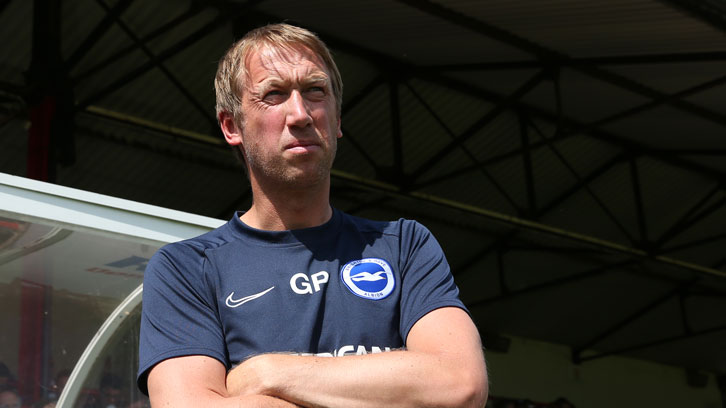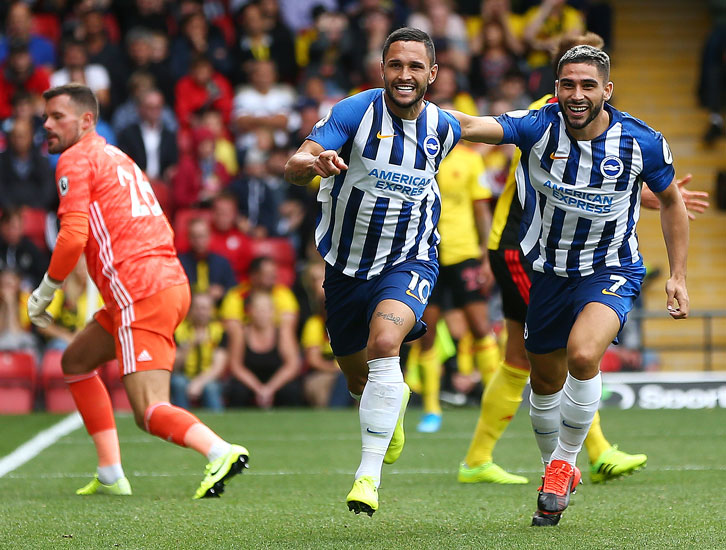
West Ham United will need to dim of one of the brightest minds in English football if they are to end their Brighton & Hove Albion hoodoo on Saturday.
Graham Potter was appointed Seagulls boss in May, replacing former Hammers defender Chris Hughton, following eye-catching spells in charge at Swedish club Östersund and Championship side Swansea City.
It was during a long playing career that included eight Premier League appearances for Southampton in 1996, one England U21 cap and nearly 400 senior matches that Potter began coaching.
He completed a degree in social sciences from the Open University and worked in football development roles with the University of Hull, the Ghana women’s team and Leeds Metropolitan University, completing a master's in leadership and emotional intelligence at the latter.
“Without those experiences in higher education I wouldn’t have been able to do this job,” Potter told The Guardian in 2016. “It taught me a more holistic approach and prepared me for the experience of working abroad, where your cultural beliefs are challenged and, sometimes, turned on their head.”
At Östersund, his education and innovative approach, which included having his players write a book, perform a ballet and stage an art exhibition, inspired a fantastic period of growth that saw the club from the Vinterstaden – Winter City – skate from the fourth tier to the first in just five years.
A Swedish Cup win in 2017 saw Östersund qualify for the UEFA Europa League, where they defeated Turkish giants Galatasaray, Greeks PAOK, German outfit Hertha Berlin and Zorya Luhansk of Ukraine on their way to the round of 32. There, they beat Arsenal 2-1 at the Emirates, but went out 4-2 on aggregate.

Potter’s story caught the imagination and the attention of Swansea City and, together with his valued assistant Billy Reid and recruitment analyst Kyle Macaulay, he returned to the British Isles with a reputation for playing attractive, possession-based football, with a twist.
While the likes of Pep Guardiola, whose methods Potter studied, prefer to press high when they do not have the ball, the Englishman instructs his team to sit deep, get organised, then press hard and win the ball back in their own third of the pitch and build from there.
While Swansea were not promoted, analytics website StatsBomb reveals they enjoyed 57% possession (fourth-highest in the Championship) and had an expected goals (xG) differential of +0.25 (fifth-best), suggesting they should have finished higher than the tenth place they achieved in real life.
Indeed, clips of Swansea cutting teams apart with pitch-length attacking moves would undoubtedly have played a part in his appointment as Hughton’s replacement at the Amex this past summer, and there were clear signs that Potter’s tactical approach is already bearing fruit in their 3-0 opening-day Premier League win at Watford.
There, a Brighton team which enjoyed just 44.1% of the ball last season out-passed and out-touched their hosts, passing the ball confidently and patiently in their own half – playing with three centre-backs in a 3-4-3 formation – before springing forward and creating well-taken goals scored by mobile strikers Florin Andone and Neal Maupay.
It is unclear whether the Brighton squad have written a book or performed a ballet, but the football they exhibited at Vicarage Road could fairly be described as a work of art.
Next, the highly-educated Potter will seek to give West Ham United a footballing lesson, and the Hammers will need to do their homework if they are to avoid failing what is sure to be a tough examination on the south coast.